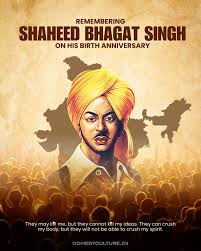Shaheed Bhagat Singh: The Revolutionary Legend of India

Introduction
Shaheed Bhagat Singh remains a cornerstone in the history of India’s struggle for independence. Born on September 28, 1907, in Banga, Punjab, his revolutionary fervor and commitment to the cause of freedom have immortalized him as a national hero. His ideals of socialism and anti-imperialism resonate through generations, inspiring countless individuals to challenge oppression and fight for justice.
Major Events and Contributions
Bhagat Singh played a crucial role in the Indian independence movement, particularly in the 1920s. A pivotal moment in his life came in 1928 when he sought revenge for the death of activist Lala Lajpat Rai, who was fatally injured during a protest against British police. Singh and his associates, including Sukhdev Thapar and Shivaram Rajguru, plotted to kill the superintendent of police, James A. Scott. In an unfortunate turn of events, they mistakenly killed J.A. Saunders instead.
In 1929, Bhagat Singh and Batukeshwar Dutt threw non-lethal bombs in the Central Legislative Assembly to make their voices heard against repressive laws. They were arrested on the spot, turning their trial into a platform to propagate their revolutionary ideals. Utilizing this opportunity, Bhagat Singh famously declared, ‘Revolution is not merely a matter of guns and bombs; it is a fundamental shift in the society’s structure.’ His writings and speeches during imprisonment became pivotal in galvanizing youth across the nation.
Despite widespread support from the Indian populace, Bhagat Singh, along with his comrades Sukhdev and Rajguru, was sentenced to death. On March 23, 1931, they were hanged, and their martyrdom ignited a fire within the nation, further accelerating the fight against colonial rule.
Conclusion
Today, Shaheed Bhagat Singh is celebrated not just as a revolutionary but as a symbol of courage and perseverance. His vision for a free and equitable society continues to inspire movements for social justice across India and around the globe. Educational institutions, parks, and public events commemorate his legacy, ensuring that the spirit of his sacrifice lives on. As India moves forward, revisiting the thoughts and ideals of Bhagat Singh remains essential for understanding the values of freedom, justice, and equality that form the bedrock of our democratic society.









